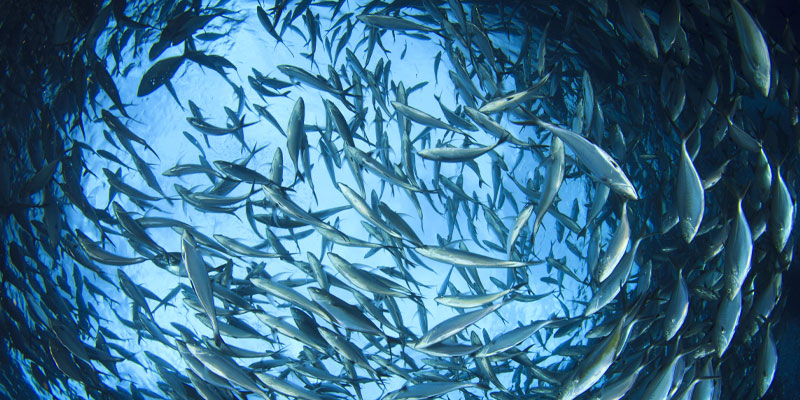Balanced harvest: mathematical underpinnings of a sustainable fisheries policy
Mathematical models developed by our researchers have improved understanding of the dynamics of marine ecosystems on an international scale.

Balanced harvest is a hugely exciting development for fisheries sustainability… It may be the answer to achieving the 'holy grail' of fishing above maximum sustainable yield, so that fish stocks are able to readily replenish themselves and catches and profits rise accordingly.
The issue
Fishing activities can have drastic effects on aquatic ecosystems. Traditional attempts to reduce this ecological impact through policy have focused on single species, and have championed the removal of large fish, giving protected status to juveniles.
In reality, fish stocks are part of larger marine ecosystems that need to be conserved as a whole. Removing big fish can disturb the ecosystems. There is also increasing evidence that this is an inefficient way of harnessing the natural production of the marine world.
Removing big fish can also set up directional selection on fish growth, maturation, reproduction, longevity and behaviour. Together with genetic variation, this is enough to produce an evolutionary change in a small number of generations. This issue will get more serious in the drive to make fishing increasingly selective to avoid wasteful discarding.
The research
Marine ecosystem models need to deal with a range of organisms from microscopic algae to large fish and marine mammals, spanning many orders of magnitude in body size.
The standard approach to understanding the resilience of a marine ecosystem to fishing appropriates the McKendrick-von Foerster partial differential equation for age distributions and assumes that it also applies to body size.
Coupling organisms of different types is done through bigger organisms preying on smaller ones. By contrast, our research analysed a stochastic model of biomass dynamics, where predation events change the mass distribution through the death of the prey and growth of the predator.
When the steady state proved to be unstable in the McKendrick-von Foerster model, the significance of our more detailed model - which we named ‘jump-growth’ - became apparent. While the inclusion of a diffusion term yielded results that (numerically) indicate good agreement with the full jump-growth equation, the analytic results were extended to include the effects of reproduction, metabolic loss and natural death.
Our research supports a fundamentally new perspective of ‘balanced harvesting’ on fisheries management: that exploitation needs to be better balanced to the natural production of components of marine ecosystems. It has the effect of reducing disruption to the natural (unfished) size structures, improving ecosystem resilience, helping to protect rare species, increasing biomass yield, and it slows down the rate of fisheries-induced evolution.
The outcome
Our results show that a balanced harvest policy offers the prospect of simultaneously increasing biomass yield while conserving the structure of marine ecosystems and their resilience.
This research has implications for ecology, conservation, food security and major consumer markets.
We have influenced the work of international NGOs with a global reach and informed policy debate in the EU Parliament as well as elsewhere, working towards long-term reform of the Common Fisheries Policy and the delivery of the EU 2020 Biodiversity Strategy.

Gustav Delius
Dr Delius has a background in quantum field theory, string theory, integrable systems and quantum groups. His research focuses on the stochastic modelling of ecological dynamical systems.

Richard Law
Professor Law's research interests span evolutionary ecology and the dynamics of biological communities. Working at the interface of mathematics and biology, he has always maintained strong links with the Department of Mathematics.
